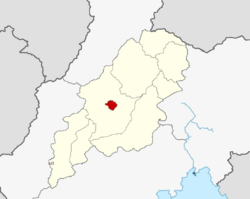Jutpandi
Jutpandi
जुटपान्डी | |
|---|---|
City | |
From top, left to right: Panorama of the Jutpandi Skyline, Jutpandi International Peace Stupa; Jutpandi Royal Palace; Bhunath; Resuri District; Mahanan Water Garden; View of the Outer Samripes from Jutpandi | |
 | |
| Government | |
| Population (2012) | |
| • Total | 1,674,394 |
| • Metro | 3.1 million |
| • Capital City | 856,494 |
| Website | www.visitjutpandi.ma |
Jutpandi (,Jot-Pan-Dee (English Pronounciation), Mahanan: जुटपान्डी), Officially the Jutpandi Metripolitan City, is the capital and most populous city of Mahana as well as the Nuragara Province with 1,600,000 people living in 350,000 houses as of 2021. The city is incredibly important as it is not only the home to the nations parliament and government but also the Gayin (leader of the Gaism religion) in the Karayanhiti Palace. It is located on the footsteps of the Samripes, with only two major access points through the M49 and M62 motorways from Ghobari and Battagara respectfully.
The city is one of the oldest continuously inhabited places in the world, founded in 10th century CE, however existing as Vaddkewatta since 433 BC. The city has historically been the capital city of great empires and nations such as the Aayan Empire, the Nadal Empire and, most recently, Mahana. The city was built in the historic region of Bāhirī, home historically to the Gaimreti people group who founded the city. Jutpandi became important as it was the only cosmopolitan urban civilisation in the Samripe foothills. As the historic capital of the Kingdom of Mahana, the city hosts great gardens, palaces and mansions which display the finest of Mahanan aristocracy. As well as this in more recent times the city has been one of two headquarters[1] of the Oriental Association for Regional Cooperation (OARC). Today, the city holds the seat of government for Mahana as well as the leader of the Gai religion.
For several centuries Jutpandi has acted as the centre for Mahana's art, literature, history, culture and economy. It contains a multi-ethnic and religious population, with followers of Hinduism, Gaism and Buddhism existing in large percentages within the city. Religious and cultural festivities make up a big part of the cities culture as well as the lives of the residents. Similarly to the rest of the country, Jutpandi's economy relies on a lot of the tourism that comes into the city.
Etymology
History
Ancient History
Post-Vaddkewatta
Following the sacking of Vaddkewatta during the war of the three kingdoms, Jutpandi was founded upon the remnants of the city.
Contemporary Jutpandi
Geography
Demographics
Government
International relations and organisations
Twin towns - Sister cities
References
- ↑ "Kotowari City and Jutpandi, Mahana, are the two headquarters of the OARC" (JPG)"







